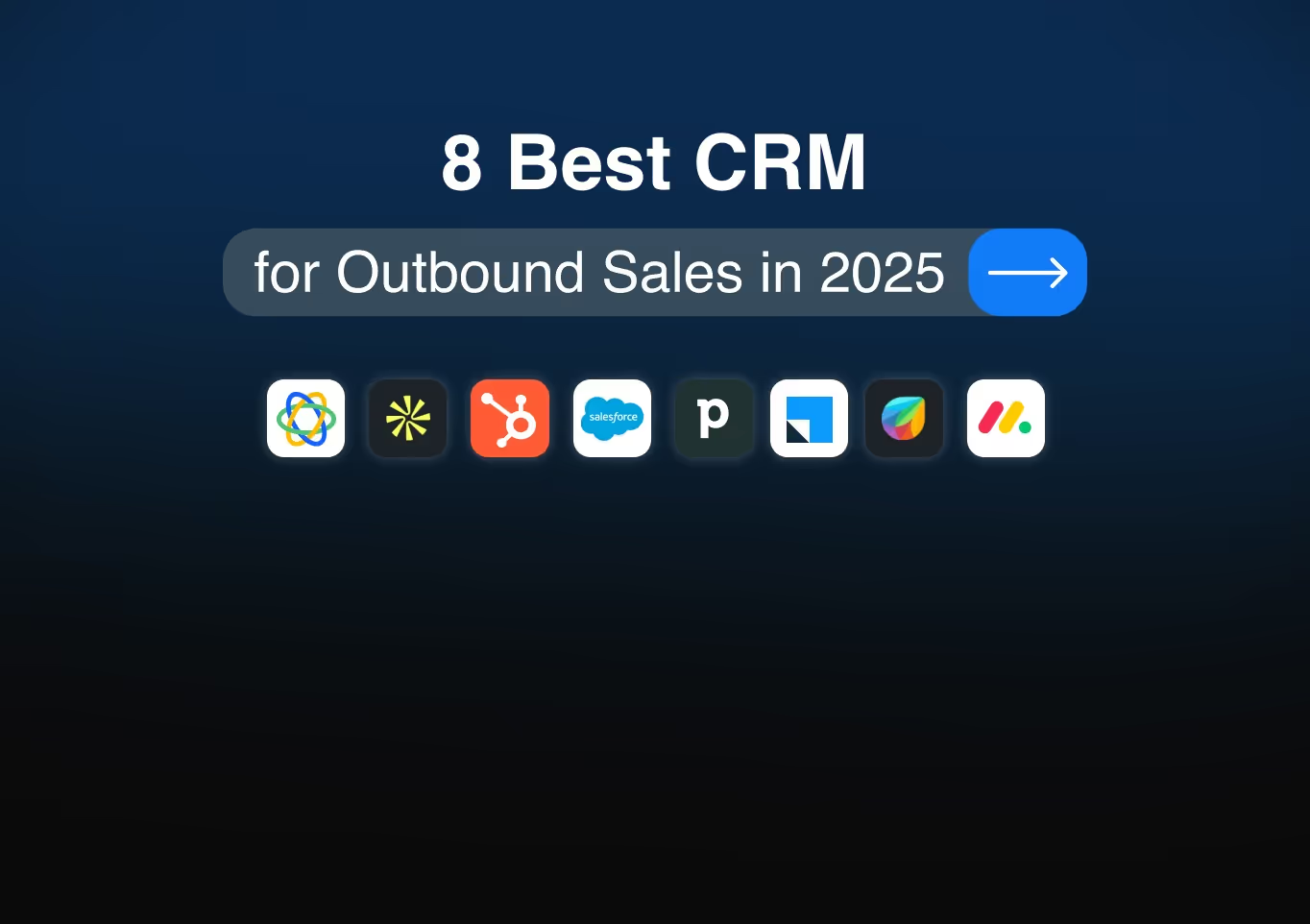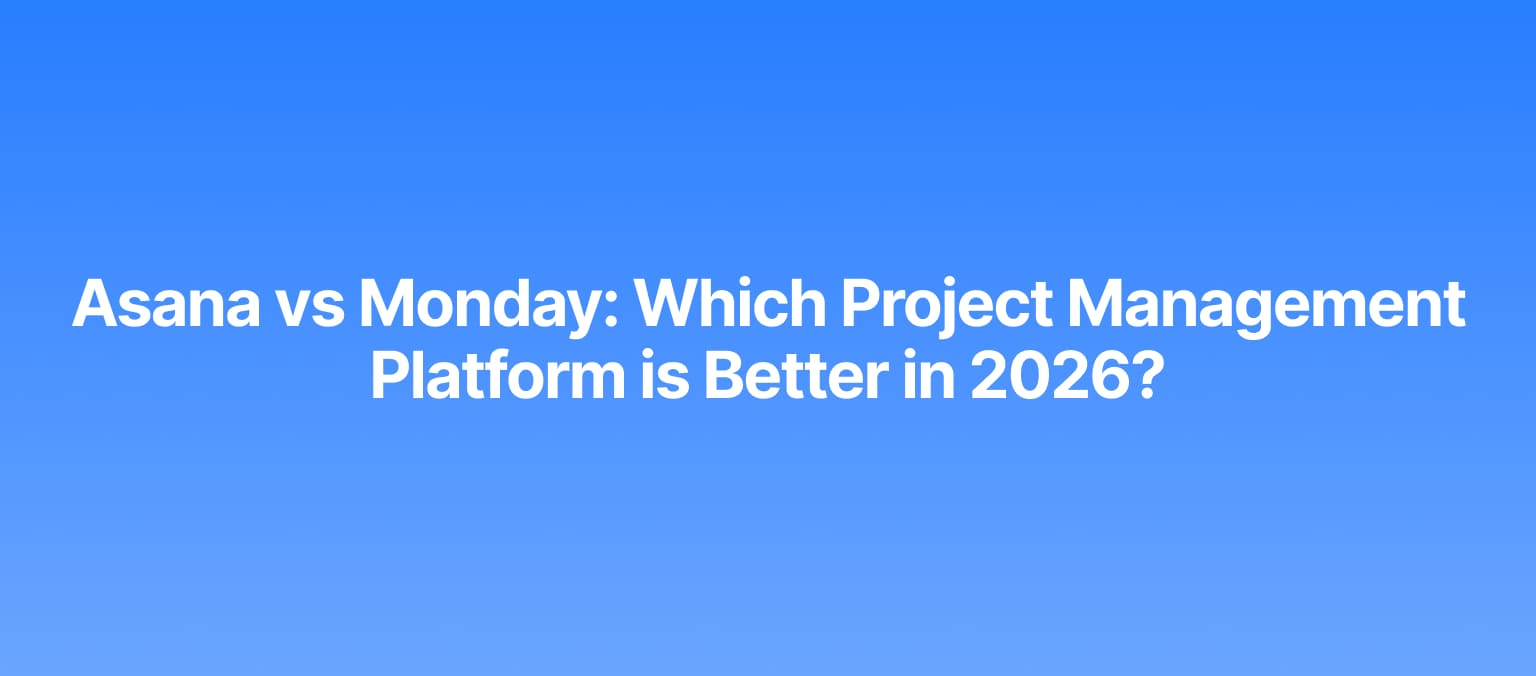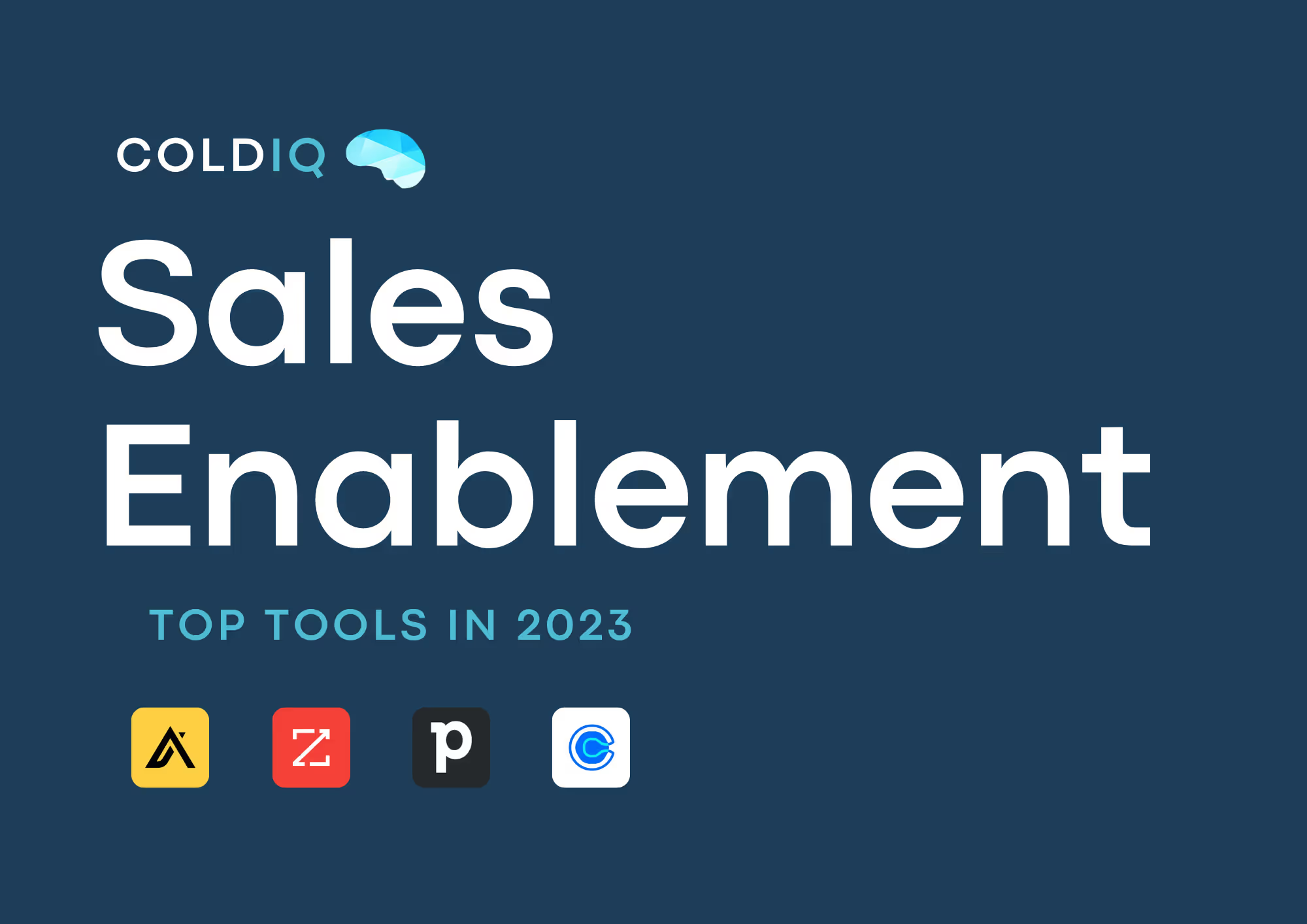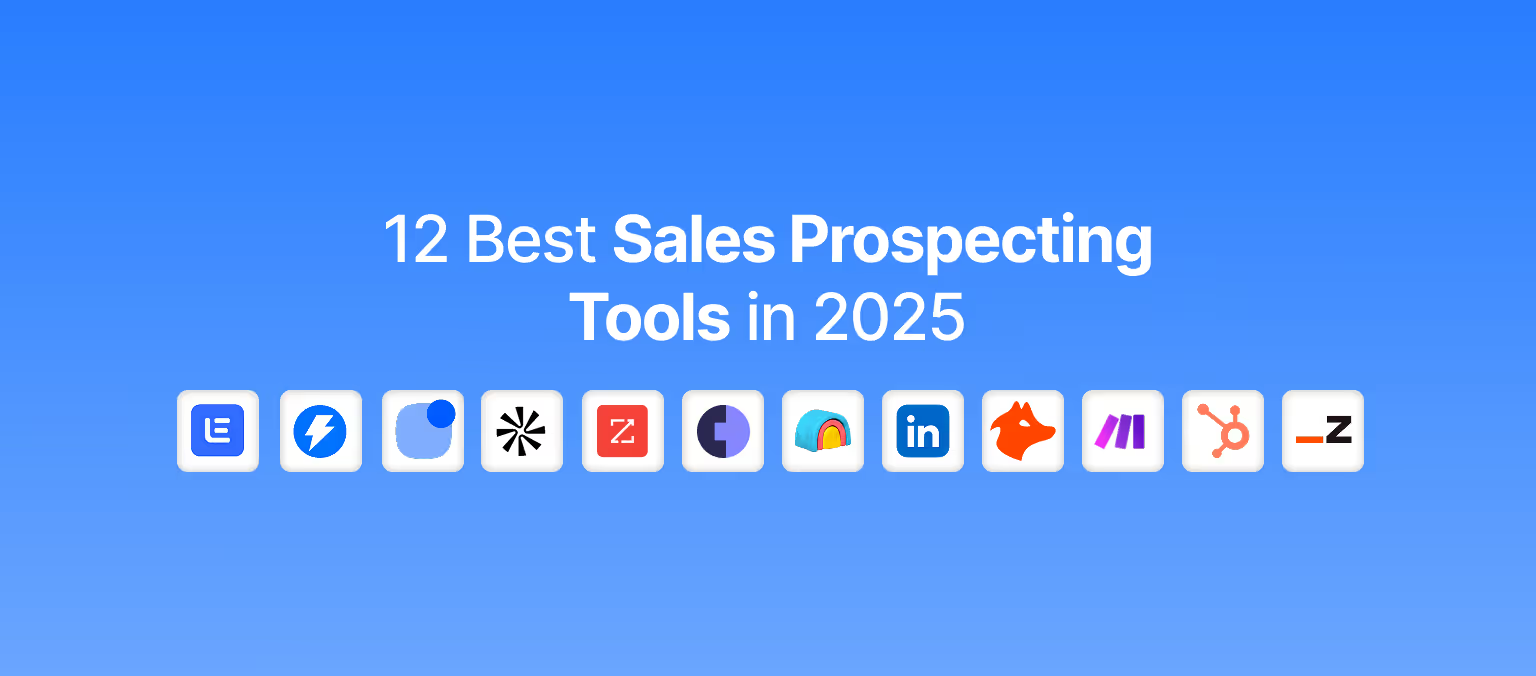8 Best CRM for Outbound Sales in 2025
Outbound sales is already tough — the last thing you need is a generic, clunky CRM that slows down your sales process. From messy data to missed communications, these systems not only waste your time; they also cost you potential revenue.
As a result, there is a need to use a CRM specifically designed for sales teams. An outbound sales CRM has unique functionalities to help you with all modern sales prospecting. Whether it’s intent-based prioritization, real-time engagement, multi-channel capabilities, or detailed reporting and analytics, these tools have the functionalities to help you work better and smarter.
On top of that, you get to manage customer relationships and drive revenue growth for your business. In this article, we've compiled a list of the 8 best CRM for outbound sales in 2025. Let’s get started.
Why Outbound Sales Needs a Specialized CRM
Let’s cut through the noise — a generic CRM can’t fully support your outbound prospecting workflow; it creates problems instead. Think about it. Your sales reps waste hours dealing with clunky interfaces, manually stringing disconnected data points, or find it challenging to extract actionable insights to make smarter decisions.
The reason is that these CRMs were designed to support inbound sales or customer service. They lack specific features that cater to the needs of outbound sales. That’s why your sales team runs into challenges like:
- Lack of segmentation options for high-volume leads
- Limited support for high-volume email outreach
- Lack of personalization options and automated sequences
- Inability to track outbound sales metrics.
These challenges inhibit productivity and reduce efficiency. So, rather than looking for a CRM that only stores data, we advise looking for one with specific key features that fit your needs. These features include:
- Lead Segmentation: Enables you to classify leads based on their characteristics and behaviors
- Email sequences: Offers personalization and automated sequences for bulk email campaigns.
- Dialer: Allows you to make calls and track sales conversations within the CRM.
- Pipeline management: Provides a comprehensive overview of your pipeline within the sales cycle.
- Integration: Integrates with third-party tools for easy data transfer and enhanced workflow.
Having these features will not improve your sales workflow, but will help you focus on what matters most: building genuine relationships with your prospects.
Also Read: How to Leverage AI for Sales Prospecting
Which are the 8 Best CRMs for Outbound Sales?
1. Close CRM – Best all-in-one CRM for outbound calling and email

Strengths: Power dialer, email automation, built-in calling/SMS, task workflows.
Best for: Small to mid-size outbound teams focused on high-volume outreach.
Why it’s great: Everything is in one place—no need for 3rd-party dialers or integrations.
Close CRM is an all-in-one customer relationship management (CRM) software designed for sales teams to streamline their processes and close deals more efficiently.
Close helps sales teams to manage all their sales processes in one place — from initial outreach to closing deals. It’s suitable for growing sales teams, startups, and small and mid-sized businesses (SMBs) who want to streamline their outbound sales operations. The comprehensive CRM combines communication tools (email, calling, SMS), automation features, pipeline tracking, and reporting capabilities to drive efficiency.
Unlike other CRM systems, Close builds its platform on core sales activities, prioritizing the email and calling features. Besides, its intuitive interface makes it efficient for sales teams that deal with high-volume outreach.
Key Features
Built-in Calling System: You can make and receive calls within the CRM using automatic call recording, logging, and voicemail capabilities.
Email Automation: You can craft, send, and track personalized email sequences, scaling your outreach efforts.
Tracking Capabilities: It features a comprehensive dashboard that measures your campaign performance with customizable metrics.
Pros
- Its intuitive interface makes it easy to use for sales teams and boost sales activities.
- It has strong communication tools that you can use to interact with prospects.
- It has excellent reporting capabilities that you can use to measure sales performance.
Cons
- It’s more focused on sales than marketing or customer service.
- The system sometimes glitches, preventing users from receiving calls or attaching documents to emails.
Pricing
Close’s pricing plans start at $49 per month
2. Apollo.io – Best for data + outreach + CRM combined

Strengths: Massive prospecting database, sequences, Chrome extension, engagement tracking.
Best for: SDR teams that need lead sourcing and multichannel outbound in one platform.
Why it’s great: Combines LinkedIn/email/phone outreach with a built-in CRM.
Apollo is a sales intelligence and engagement platform designed to boost your outbound sales efforts. It combines a vast B2B contact database, data enrichment features, outreach automation, and CRM functionalities to help sales teams identify and convert qualified leads at scale.
Apollo helps sales and marketing teams find qualified leads, build targeted lists, automate their outreach efforts, and manage pipelines. It’s suitable for sales managers, SDRs, startups, and SMBs seeking to boost their outbound efforts.
Apollo stands out with its unified approach, where it combines a massive B2B lead database, sophisticated outreach features, and CRM capabilities, which allows it to carry out sales activities from a single platform.
Key Features
Contact Database: With Apollo, sales teams have access to over 210 million contacts and their contact information, including emails, phone numbers, and social profiles, enabling precise targeting.
Intent Signals and Prospecting: It provides buying signals that allow you to reach your prospects at the right time.
Multi-Channel Engagement: You can reach your prospects by sending personalized emails, making cold calls, or connecting on LinkedIn from the same platform.
Analytics and Reporting: You can measure your campaign’s performance with metrics like open rates, click-through rates, and response rates, optimizing your sales strategies.
Pros
- It has an intuitive interface that is easy to navigate and use.
- It has strong automation capabilities for scaling outreach efforts.
Cons
- Some users on G2 report data quality issues that prevent them from having sales success. For instance, inaccurate contact information isn’t useful to sales teams, as they won’t reach their prospects.
Pricing
Apollo offers a free trial with limited credits, but its paid plans start at $59 per month.
3. HubSpot Sales Hub (Pro or Enterprise) – Best CRM if you want scalability and integrations
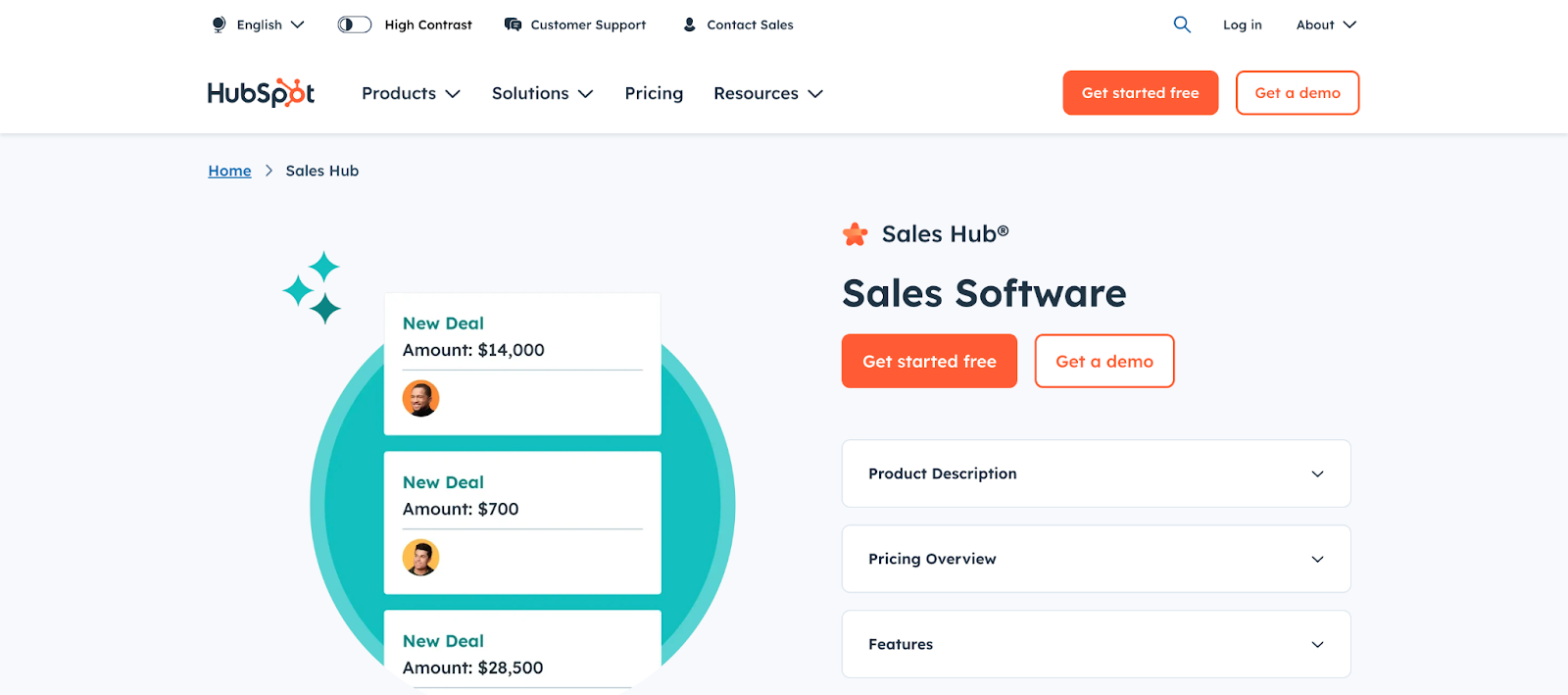
Strengths: Visual pipelines, workflows, robust integration ecosystem, email tracking.
Best for: Teams needing a scalable system with marketing/sales alignment.
Why it’s great: Easy to use, highly customizable, and integrates with nearly everything.
HubSpot is another CRM that helps businesses manage their sales, marketing, and customer service operations from one place. It offers a variety of features for outbound sales, helping them to prospect, engage, and close deals.
HubSpot Sales CRM is a centralized platform that helps sales professionals to organize and store contacts, track interactions, and manage pipelines. The sales-focused CRM automates repetitive tasks, centralizes contact management, and provides data-driven insights to aid interactions and manage pipelines effectively. It’s suitable for sales leaders, sales development teams, and account executives actively engaging in outbound sales.
Its intuitive interface and powerful functionalities make it easy to build pipelines, gain visibility into team performance, and manage pipeline health. Besides, sales teams or businesses can leverage the tool’s free version to start and scale later.
Key Features
Contact Management: It offers a centralized repository to store and manage prospects’ information.
Sales Automation: You can set up automated and personalized multi-channel sequences to engage your audience effectively.
Call Tracking: You can make and track calls more efficiently with subfeatures like call recording and smart prioritization, allowing you to focus on the most important conversations.
Playbooks: Your sales team can use resources like call scripts, positioning guides, or competitor battlecards to manage deals effectively.
Pros
- HubSpot has an intuitive interface that makes it easy to use and navigate.
- The dashboard is highly customizable and provides detailed information about your pipeline health.
- It seamlessly integrates with several third-party platforms like communication tools, email outreach tools, and more.
Cons
- The platform can become expensive as your team scales
- Its advanced features require a higher-tier subscription.
Pricing
HubSpot Sales’ pricing plans start at $100 per month/seat.
4. Salesforce Sales Cloud – Best enterprise-grade CRM for outbound teams
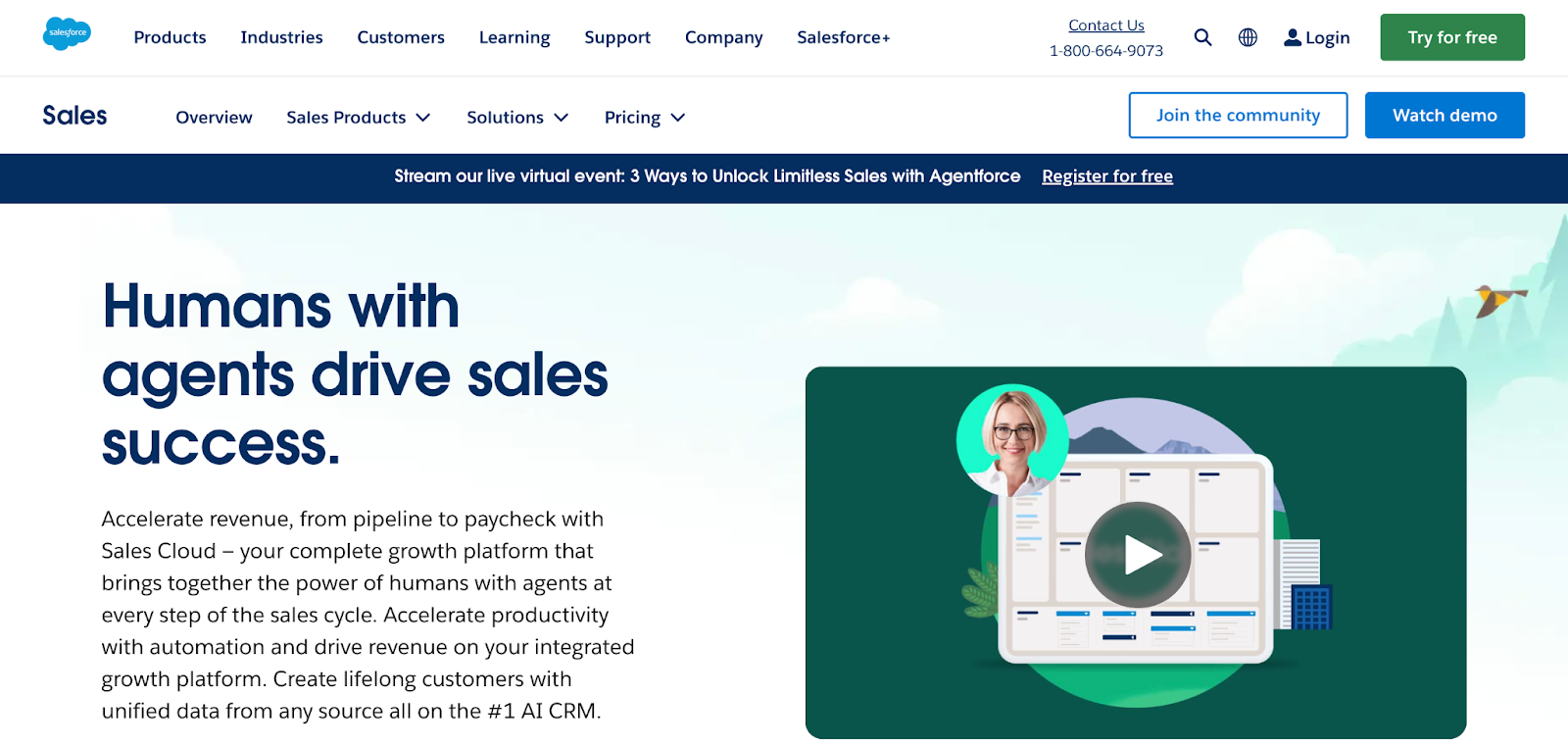
Strengths: Custom workflows, massive integration ecosystem, advanced reporting.
Best for: Enterprise sales orgs with internal Salesforce admins and budget.
Why it’s great: Ultimate control and flexibility, but requires setup time.
Salesforce is a leading CRM platform that allows businesses to build relationships, manage customer interactions, and streamline sales processes effectively. It’s renowned for its flexibility and enterprise-grade capabilities that scale and optimize sales operations.
Salesforce provides a variety of tools to centralize customer data, automate routine tasks, and manage customer interactions. It’s ideal for businesses of all sizes — from startups to enterprises — across different industries. It can help sales development teams, sales leaders, and account executives to optimize their sales cycle and drive revenue growth for businesses.
Salesforce stands out for its robust customizable options, scalability, and integration features, which solve specific industry problems and drive business growth.
Key Features
Lead Management: Salesforce features a centralized database that houses prospects’ information, enabling sales teams to focus on high-value opportunities.
Sales Engagement: Salesforce supports multi-channel communication (email, call, or SMS) to streamline your outreach efforts.
Sales AI: The CRM provides different kinds of AI, including generative and predictive AI, to automate routine tasks and predict which leads are most likely to convert.
Pipeline Visibility: Its dashboard provides comprehensive information about your pipeline health, helping you to identify problems and optimize your sales strategy.
Pros
- It has highly customizable features that evolve to fit business needs.
- Its analytics and reporting capabilities provide data-driven insights that help you make smarter decisions.
- It integrates with third-party platforms for easy data transfer and efficient workflow.
Cons
- It has a steeper learning curve than other, simpler CRM systems. This makes it challenging to use and navigate, especially for users without a technical background.
- It can be expensive, especially with its add-on features and per-user pricing.
Pricing
Salesforce’s Sales Cloud starts at $165 per month/user.
5. Pipedrive – Best CRM for pipeline simplicity and outbound email automation

Strengths: Drag-and-drop pipeline, email templates, workflow automation, lead scoring.
Best for: Small to mid-sized outbound teams that want simplicity and speed.
Why it’s great: Very intuitive with just enough automation to scale cold outreach effectively.
If you want a sales-focused CRM that helps to manage leads and close deals efficiently, Pipedrive is a perfect choice. It’s renowned for its activity-based selling, strong automation features, and visual pipeline management that helps to optimize your lead generation efforts.
Pipeline helps sales teams and leaders to streamline their sales process, right from initial outreach to closing deals. It automates repetitive tasks, freeing up time to focus on high-value opportunities.
Pipedrive stands out for its intuitive, visual pipeline interface that provides detailed information about the deals in your pipeline. Besides, its drag-and-drop pipeline and automation features keep teams organized and allow them to build powerful workflows to streamline their processes.
Key Features
Custom Sales Pipeline: It features a drag-and-drop visual interface that provides a clear overview of your entire sales process.
Email Communication and Tracking: It syncs with email service providers to track all communications from a single platform.
Automation: You can reduce manual tasks with automated outreach efforts to prioritize other high-value tasks.
Pros
- Its highly visual interface allows you to manage your pipeline efficiently
- You can automate repetitive tasks to save time and focus on high-value activities.
Con
Its advanced customizable options require a steep learning curve, which may consume time.
Pricing
Pipedrive offers a 14-day free trial, but its pricing plan starts at $24 per month.
6. LeadSquared – Best CRM for outbound teams in emerging markets (esp. India & SE Asia)

Strengths: Auto lead distribution, telephony integrations, workflow automation, API support.
Best for: Fast-scaling sales teams doing high-volume outreach across multiple channels.
Why it’s great: Affordable, powerful, and tailored to outbound-heavy sales orgs in growth markets.
LeadSquared is a specialized CRM designed to streamline outbound sales processes. With a strong focus on automation, communication, and lead management, sales teams can leverage this tool to boost productivity and improve conversions.
The CRM allows you to manage all sales activities, from lead capturing to email sequences, phone calls to scheduling meetings, from a unified platform. Sales representatives, managers, and marketing platforms can automate repetitive activities to streamline their workflow and boost their outbound efforts.
LeadSquared is renowned for its lead management and workflow automation features that allow sales teams to carry out their operations with speed and efficiency.
Key Features
Lead Scoring and Distribution: Assigns scores to leads and qualifies them based on predefined criteria to help sales teams focus on those who are more likely to convert.
Sales Engagement: Crafts bulk cold email campaigns and manages call conversations to build relationships with prospects.
Workflow Automation: Allows sales teams to create workflows and manage sales processes without a technical background.
Pros
- Its user-friendly interface allows sales reps to navigate and use it efficiently.
- Its strong automation capabilities help to reduce manual tasks and save time.
- Its robust reporting features help to track the team’s performance.
Cons
- Limited native integrations, which can disrupt the workflow.
- It may be expensive for users due to its per-user model.
Pricing
LeadSquared’s pricing plans start at $40 per user/month.
7. Freshsales (by Freshworks) – Best CRM for AI-powered lead scoring and outreach
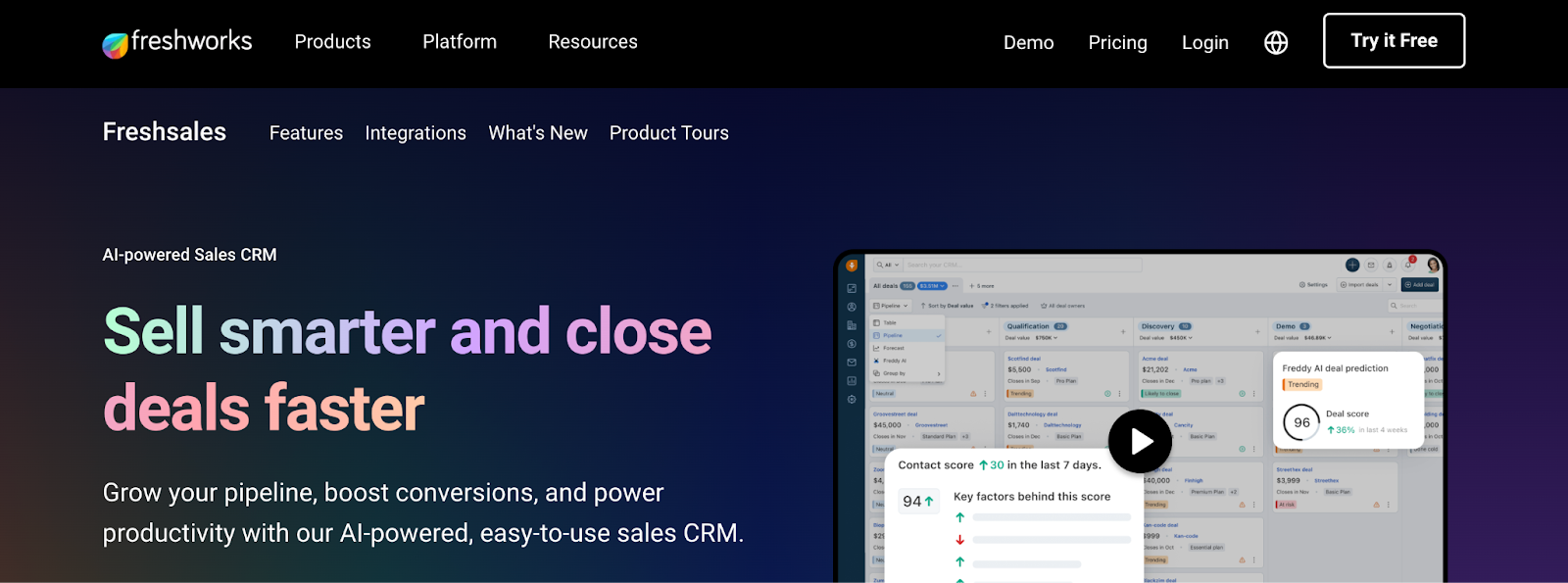
Strengths: Built-in phone/email, lead scoring, Freddy AI for next-best actions.
Best for: SMBs and mid-market teams that want intelligence and automation in one place.
Why it’s great: Great value for money with modern outbound tools baked in.
Freshsales is an AI-powered CRM designed specifically for sales teams with a centralized platform to manage leads, automate repetitive activities, and track communications.
With its AI algorithm, the platform helps sales teams offer valuable data-driven insights to manage their outbound sales processes and scale operations. It’s suitable for sales professionals, managers, and startups seeking to transform from manual processes to automated ones.
What sets it apart is its intuitive interface that enables sales teams to use and navigate with minimal onboarding time. Besides, its AI-powered features offer contextual suggestions to improve your outbound efforts.
Key Features
Pipeline Management: Provides a 360° view to visualize and manage deals
AI-Powered Assistance and Insights: Freddy AI offers valuable insights to help work smarter and easier in aspects like email writing
Workflow Automation: Automates repetitive tasks to help you run smarter sales campaigns and generate more leads.
Pros
- Its AI capabilities offer valuable insights to help your sales process and make smarter decisions.
- Its user-friendly interface allows a fast learning curve that takes little time to comprehend.
- Its flexibility and customizable options evolve to fit a business’s needs.
- Unlike other platforms, it’s affordable and suitable for small teams or businesses.
Cons
- Unlike enterprise-level CRMs, it has limited customizable options, which can inhibit efficiency.
- Some G2 reviewers complain about its reporting functionalities, which make it challenging to generate reports.
Pricing
Freshsales offers a 21-day free trial, but its pricing plans start at $9 per user per month.
8. Monday Sales CRM – Best for teams that want CRM + task/project tracking in one
Strengths: Custom pipelines, automations, visual dashboards, outreach integrations.
Best for: Outbound teams that also need project or ops management.
Why it’s great: Combines outbound CRM features with work management flexibility.

Source: Monday
Monday CRM is a highly customizable customer relationship management platform designed to streamline sales processes while maintaining visibility across the sales pipeline.
Monday centralizes prospect data, communication history, and sales activities in one place. It helps to track leads, manage follow-ups, and close deals more efficiently. It’s useful for sales teams, agencies, and businesses seeking to scale their sales operations.
What makes Monday CRM stand out is its exceptional customizability, which allows you to build workflows without requiring any technical experience. Besides, its colorful user interface makes it easy to adopt, while its automation capabilities reduce manual effort.
Key Features
Visual Pipeline Management: Its drag-and-drop interface shows how deals progress in colored statuses, making it easy to identify pain points and areas of opportunity.
Contact Management: Allows you to organize, track, and segment leads with custom fields.
Workflow Automation: Users can create custom triggers to automatically assign leads, follow up on prospects, and move deals through the pipeline.
Pros
- Its visually intuitive interface allows quick adoption for users.
- It integrates seamlessly with popular third-party tools, streamlining your sales workflow.
- It has great collaboration features that allow teams to contribute to projects.
Cons
- Setup can be overwhelming due to the highly customizable options.
- Some advanced features are complex for users.
Pricing
Monday CRM’s pricing plans start at $15 per month/seat.
Also read: The Ultimate Guide to Sales Prospecting
How to Choose the Best CRM for Outbound Sales
While there are different outbound sales CRMs in the market, choosing the wrong one can hurt your team’s productivity. As a result, here are five factors you should consider when choosing the best CRM for outbound sales.
1. Multichannel outreach capabilities (email, phone, LinkedIn)
A dedicated CRM that doesn’t have multi-channel capabilities only handcuffs your team. After all, your prospects aren’t hiding in a single channel. So if you can’t switch between systems to send emails, make calls, or send messages on LinkedIn, you’re limiting your business from getting enough responses that could drive revenue growth.
As a result, it’s essential you choose a tool with these capabilities to reach your prospects on their preferred channels to drive engagement rates. This increases your chances of getting a positive response and, ultimately, conversions.
2. Built-in prospecting or integrations with data tools
Let’s admit this. An outbound CRM without robust data capabilities is a pipeline killer. If they have to research and manually input their leads’ data and contact information, they’re wasting time and deprioritizing high-value opportunities.
However, an outbound CRM with built-in prospecting or integrations makes your team work not only faster but also smarter. By segmenting leads based on their intent, you get to prioritize accounts that are most likely to buy from you. Besides, seamless integration allows the tool to connect with other systems, enhancing your workflow.
3. Automation and sequencing
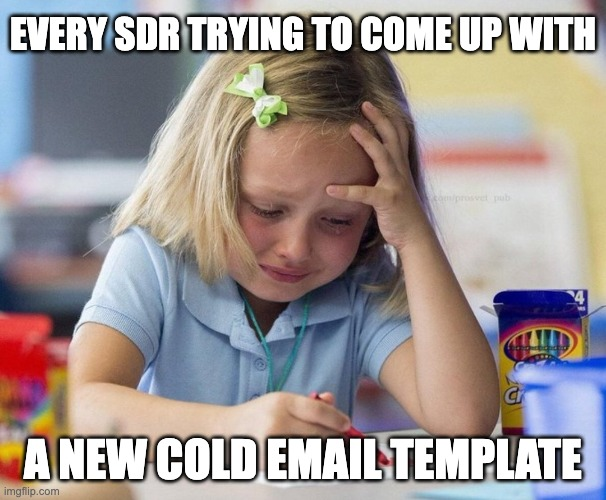
Repetitive tasks like manual sequences waste time, wear out your team, and prevent efficiency. If this continues for a long time, most of your sales opportunities will eventually fall through the cracks. To avoid this, it’s best to opt for a tool with automation and sequencing capabilities. An outbound CRM that automates repetitive tasks saves time and allows you to focus on high-value tasks like building relationships and closing deals.
4. Real-time activity tracking and reporting
Your outbound CRM is a primary intelligent system. It must capture every meaningful interaction — from emails opened to links clicked — and present it in an actionable format. This action empowers your sales team with real-time buying signals to focus on the most promising prospects.
Besides, its reporting and analytics capabilities provide detailed information about your campaign performance, showing you what's working and areas of improvement. This allows you to continuously refine your strategies till you achieve better sales results.
5. Ease of use and scalability

If your sales team spends time and mental energy navigating complex user interfaces or waiting for a sluggish system to respond, it’s not your best option. It will slow down your process and prevent you from hitting your sales target on time.
However, an outbound CRM with a user-friendly interface allows your team to easily navigate the platform, access information, and leverage its functionalities to streamline sales operations. Besides, they can adapt to future needs as your business grows.
Conclusion
If your team isn’t using an outbound CRM in this age, you’re slowing down your sales process and missing out on potential revenue. Outbound CRMs provide you with unique sales features that boost productivity and drive efficiency.
If you can’t maximize the full potential of these tools, we advise partnering with ColdIQ. Our sales experts leverage different AI sales tools, including outbound CRMs, to fill your sales pipeline with qualified opportunities and drive revenue growth. Book a demo with us today!
Frequently Asked Questions about Outbound Sales CRM
1. How is outbound CRM different from a classic one?
An outbound CRM is different from a classic one by having specific features that cater to the needs of an outbound sales team. For instance, you can send bulk personalized emails with an outbound CRM that a classic one can’t perform.
2. What are the challenges of using general CRM software for outbound sales?
Some challenges of using generic CRM software include a lack of segmentation options for high-volume leads, Limited support for high-volume campaigns, and inability to track outbound sales metrics.
3. How to boost your outbound sales efficiency with a CRM
You can boost your outbound sales efficiency with a CRM by automating repetitive tasks like email sequences and auto-dialling and integrating with other tools for an enhanced workflow.
4. How do you automate outbound sales?
You can automate outbound sales with AI sales tools and technologies, allowing you to focus on more high-value activities.
FAQ
A CRM might not fit outbound sales if it lacks bulk emailing, call tracking, or lead progression tools. Also, if it doesn’t support automation, it can slow down outreach efforts and limit personalization. Monitoring effectiveness becomes harder without detailed analytics.
CRMs help by organizing call lists, tracking call outcomes, and automating follow-ups. They can also provide scripts and reminders, ensuring sales reps maintain consistency and don’t miss touchpoints. This makes cold calls more structured and impactful.
How important is CRM integration with other sales tools?
What role does automation play in managing outbound sales workflows?
Let's Get Started!
Schedule a 30-minute call with ColdIQ leadership to learn how our outbound strategy and sales tools help generate qualified leads and close deals.
.avif)
.svg)
